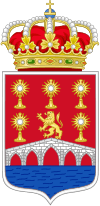Viveiro
| Viveiro | |||
|---|---|---|---|
| Municipality | |||
|
Church of St. Francisco | |||
| |||
 Viveiro | |||
| Coordinates: 43°38′53″N 7°35′24″W / 43.64806°N 7.59000°W | |||
| Country | Spain | ||
| Community | Galicia | ||
| Province | Lugo | ||
| Comarca | A Mariña Occidental | ||
| Government | |||
| • Mayor | María Loureiro García | ||
| Area | |||
| • Total | 109.3 km2 (42.2 sq mi) | ||
| Elevation | 12 m (39 ft) | ||
| Population (2010) | |||
| • Total | 16,211 | ||
| • Density | 150/km2 (380/sq mi) | ||
| Demonym(s) | Viveirenses | ||
| Time zone | CET (UTC+1) | ||
| • Summer (DST) | CEST (UTC+2) | ||
| Postal code | 27850 | ||
| Website | Official website | ||
Viveiro (Galician pronunciation: [biˈβejɾo]) is a town and municipality in the province of Lugo, in the northwestern Galician autonomous community of Spain. It borders on the Cantabric Sea, to the west of Xove and to the east of O Vicedo. It has a residential population of over 16,000 (2010 figures), which however triples in the summer months with visitors to the coastal region.
Geography and location
The climate is mild oceanic.
The municipality encompasses the township of Viveiro itself (the main population centre on the Lugo coast), and also the towns of Covas and Celeiro. More than half of the municipality's population live in these three centres.
Viveiro municipality is subdivided into several administrative areas (parroquias, or parishes): Area-Faro, Boimente, Chavín, Galdo, Landrove, Magazos, San Pedro, Valcarría, Celeiro, Vieiro, Covas and Viveiro.

Main sights
The old wall, of which only parts remain today, were built to protect the inhabitants from the attacks or from the plague. The remains of the wall, which succumbed to the modernity of last centuries in spite of its importance and simplicity, are easily localized in the old part of the city although they are situated near small moderns buildings. In spite of everything three of its original doors remain upright: the door of Valado with a Romanesque style, the door of Castelo da Ponte, also called the door of Carlos V, that is the emblem of Viveiro. This door has the sculpted imperial arms of the monarch, the original arms of the kingdom and the own arms of the city.
Some of the mansions of the city's noble families are still existing, such as the gunsmith's house sculpted in stone. Religious buildings include the monastery of the Concepcion, which was founded by María das Alas Pumariño (died 1601), and the chapel of Ecce Homo, also called the chapel of Pity, which was built at the expense of Rodrigo Alonso Alfeirán (died 1608).
The city is also home to several Romanesque historical buildings. These include the churches of San Pedro, Santa María or San Francisco. The bridge over the river Landro is of medieval origins too.
Festivities
The calendar of Viveiro holds several festivals, both secular and religious.
Carnival
Viveiro's is the oldest Carnival in Galicia. It is celebrated during the four days before Lent, from Saturday until Shrove Tuesday. It concludes on Tuesday with a great procession of floats through the streets.
Holy Week
The Holy Week in Viveiro is one of the most important Holy Week celebrations in Galicia and it is also considered as a Fiesta of International Tourist Interest of Spain since 2013.[1] Vivero has a great number of cofradías such as the Virgin of the Rosario, the Christ of the Piety, the Seven Words and St. Cross. The city is also home to processions such as the Encounter that show the Calvary of Christ with religious images, the Unnailed and St. Funeral that show the descent of the Cross to continue with the procession of St. Funeral, the Last Supper with the pasos of the supper, Horto, Ecce Homo, the Nazarene and the Virgin of the Dolores- Sufferings, the Passion, the Seven Words, the Piety and the Virgin on foot of the Cross, a silent procession.
Rapa das Bestas
This festivity takes place the first Sunday of July except that the first of July coincides on Sunday then it celebrates the second Sunday in the Buio Mountains. It is an old tradition according to which people cut the horsehairs, brand the horses and break in them.
Patronal feasts
It celebrates on 15 August in Saint Roque and the Virgin's honour.
The pilgrimage of Naseiro (The pilgrimage of the good meal)


It celebrates the fourth Sunday of August.
Saint James' day
It celebrates on 25 July at the Port of Celeiro with a marine procession through the estuary of Viveiro.
Others
In the end of July or in the beginning of August, a music festival called Resurrection Fest, focused on metal, hardcore and punk is held in the city since 2006.[2]
Notable people
- Maruja Mallo (1902 - 1995), surrealist painter[3]
- Carlos Oroza (born 1933), poet[4]
- Gómez Pérez das Mariñas (1539 - 1593), politician, diplomat and military officer, colonial governor of the Philippines
- Nicomedes Pastor Díaz (1811 - 1863), politician and Romantic writer
- Antón Vilar Ponte (1881 - 1936), writer and politician[5]
- Lois Tobío Fernández (1906 - 2003), journalist and philologist
Town twinning
References
- ↑ "Viveiro celebra que su Semana Santa sea de Interés Turístico Internacional" (in Spanish). La Región. Retrieved 18 April 2013.
- ↑ "Web oficial RESURRECTION FEST". Resurrection-fest.com. Retrieved 2013-10-12.
- ↑ El País. "Las espigas surrealistas de Maruja Mallo". Retrieved 17 October 2010.
- ↑ Xornal de Galicia. xornal.com, ed. "Carlos Oroza: "La literatura gallega no fue hospitalaria conmigo"". Retrieved 17 October 2010.
- ↑ Galegos.info. "Galegos - Antón Villar Ponte". Retrieved 17 October 2010.
External links
| Wikimedia Commons has media related to Viveiro. |
- Ferrol-San Cibrao Port Authority (English)
| ||||||||
| ||||||||



